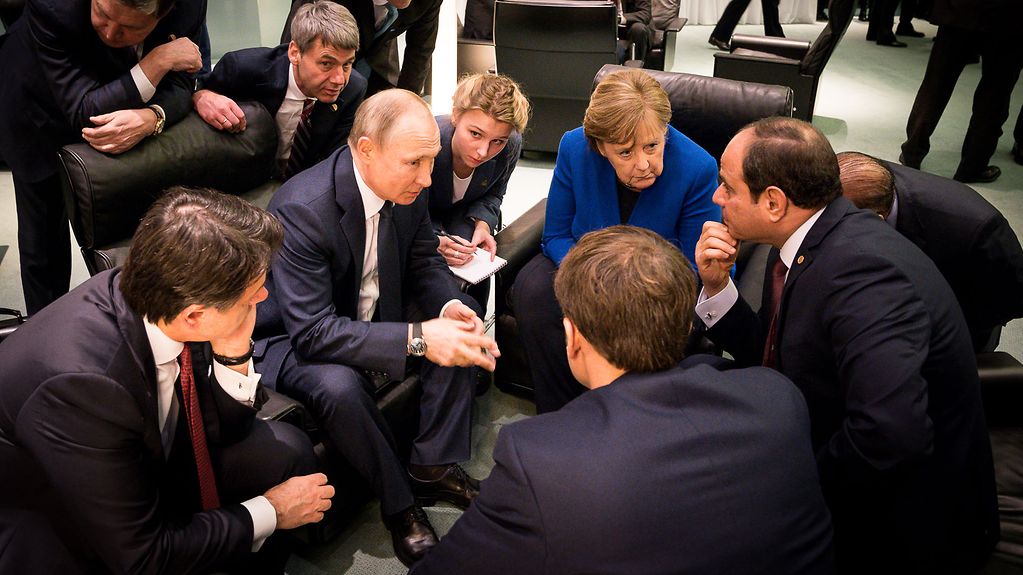Agreement at the Berlin Conference on Libya
At the Conference on Libya, participants have resolved to respect the arms embargo and impose stricter controls, announced the Chancellor on Sunday evening at a final press conference. Angela Merkel had invited representatives of a total of 12 states to the conference in Berlin to support the efforts of the United Nations to bring peace to the country that has been devastated by civil war.
3 min reading time

Intensive discussions at the Conference on Libya. In agreement with the Secretary-General of the United Nations, Chancellor Angela Merkel hosted the Conference on Libya in Berlin.
Photo: Bundesregierung/Kugler
"The parties present have agreed on a far-reaching plan for the way forward," declared Chancellor Angela Merkel on Sunday evening following the conference. Participants have undertaken to comply with the UN arms embargo and to stop supplying the Libyan parties to the conflict with combatants or arms. "Above all I would like to thank Mr Salamé, and of course António Guterres, most warmly," said the Chancellor. "But I would also like to say that all participants have really cooperated most constructively."
The Berlin Conference on Libya and its goal
A process of consultation on Libya was initiated in September 2019 by the German government and Ghassan Salamé, the Special Representative of the UN Secretary-General. Libya, an immediate neighbour of Europe, has been devastated by civil war. The conflict has already cost many lives.
After the conference, and following the Chancellor’s words, federal government spokesperson Steffen Seibert again pointed out that holding the conference had been the right initiative. The resolutions clear the path forward for the plan of the UN Special Representative, which was the main intention of the conference. The way forward for a political process is now open, he declared. "Now, we must stay on the ball."
During her visit to Moscow last week, the Chancellor discussed the situation in Libya and the Berlin Conference on Libya at length with the Russian President, Vladimir Putin. "I think that the meeting between Turkish President Recep Tayyip Erdoğan and Russian President Vladimir Putin in Istanbul was a good meeting. It was agreed that they would work on a ceasefire, which can be a first step to what was hammered out in the Berlin Process between the five permanent members of the Security Council and five other interested nations at top civil servant level," said the Chancellor after the meeting.
In agreement with the Secretary-General of the United Nations, Chancellor Angela Merkel issued invitations to a high-ranking Conference on Libya, to be held in Berlin. Alongside Germany, the USA, Russia, the United Kingdom, France, China, the United Arab Emirates, Turkey, the Republic of the Congo, Italy, Egypt, Algeria, the United Nations, the European Commission, the European Council, the African Union and the Arab League were all represented. In addition, the Libyan Prime Minister Fayez al-Sarraj and General Khalifa Haftar accepted the invitation to Berlin.
The German government unconditionally supports the efforts of the United Nations to achieve lasting peace and stability in Libya. It is the responsibility of the international community to make a strong, unified commitment to a ceasefire, to ending arms supplies from other countries to Libya, and to resuming the political process in this country which has been shaken by years of civil war. That was the goal of the Berlin Conference on Libya.
The start of a political process
The Berlin Conference on Libya is only the beginning of a UN-led political process. Libya’s problems cannot all be resolved in one day.
The German government is convinced that only a political solution can end the civil war in Libya. Continued military action and the intervention of external actors only worsen the situation, said Ghassan Salamé, Special Representative of the Secretary-General, before the UN Security Council.